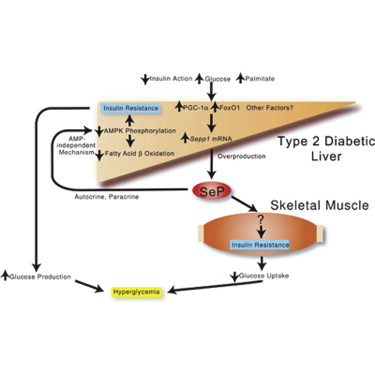 |
||||
|
||||
| 4. Liver hormone can cause insulin Resistance | ||||
The liver may regulate glucose homeostasis by modulating the sensitivity/resistance of peripheral tissues to insulin, thanks to the production of secretory proteins called "hepatokines”. New study published in the November issue of Cell Metabolism, reports that researchers have identified a hormone produced and secreted by the liver , selenoprotein P (SeP), as a previously unknown cause of insulin resistance. "The current study sheds light on a previously under explored function of the liver; the liver participates in the pathogenesis of insulin resistance through hormone secretion," said Hirofumi Misu of Kanazawa University Graduate School of Medical Science in Japan. The study reports that the liver expresses higher levels of the gene encoding selenoprotein P (SeP) in people with type 2 diabetes who are more insulin resistant. Blood levels of SeP are also increased in people with diabetes compared to healthy people. Using serial analysis of gene expression (SAGE) and DNA chip methods, the research team found that hepatic SeP mRNA levels correlated with insulin resistance in humans. |
 |
|||
| Read More | ||||
|
|
||||